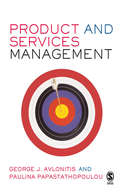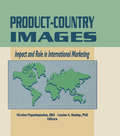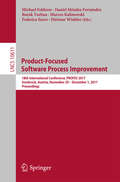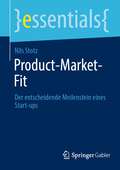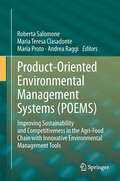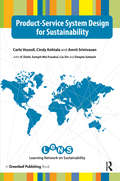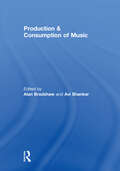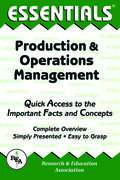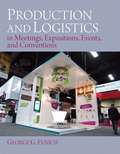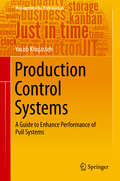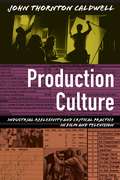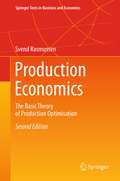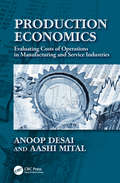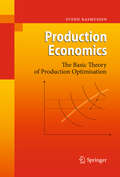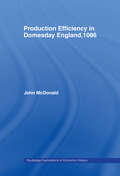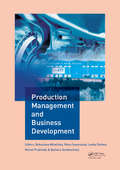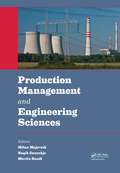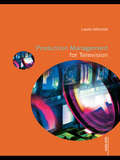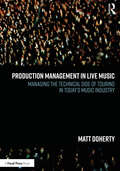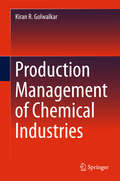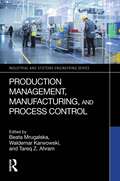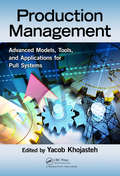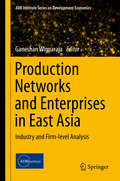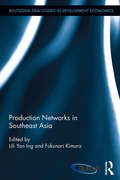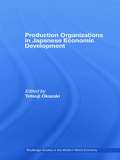- Table View
- List View
Product and Services Management
by Paulina Papastathopoulou George J. Avlonitis`A text that successfully bridges the gap between academic theorizing and practitioner applicability because it uses multiple real-world examples/mini-cases of management techniques to illustrate the well-researched academic theoretical foundations of the book' - Creativity and Innovation Management `A complete and useful treatment of the domain of product and service decisions. This book is unique in its treatment, dealing with product and service portfolio evaluation, new product/service development and product/service elimination in an integrated manner. Enlivened by many mini-cases, the book provides a soup-to-nuts approach that will prove very attractive for students and be a valuable reference for managers as well. Highly recommended' - Gary L Lilien, Distinguished Research Professor of Management Science, Penn State University `Product and Services Management (PSM) is a welcome, up to date summary of the key issues facing firms in developing and refreshing their portfolios. The examples and cases bring the academic arguments clearly into focus and demonstrate the crucial role of PSM in leading the overall strategy of the firm' - Professor Graham Hooley, Senior Pro-Vice-Chancellor, Aston University, Birmingham `Managers responsible for and students interested in product portfolio decisions previously had to consult several sources for obtaining up-to-date information; books on new product development, articles on service development, readers on product management, and frameworks for product evaluation and termination. With the book Product and Services Management the reader obtains four-in-one. Avlonitis and Papastathopoulou reveal in a compelling and comprehensive manner why product decisions are the cornerstone of modern marketing and business, and illustrate the theory with numerous mini-cases from Europe and elsewhere. A must read for everyone with a passion for products' - Dr Erik Jan Hultink, Professor of New Product Marketing, Delft University of Technology This book provides a holistic approach to the study of product and services management. It looks at the key milestones within a product's or service life cycle and considers in detail three crucial areas within product management, namely product/service portfolio evaluation, new product/service development and product/service elimination. Based on research conducted in Europe and North America, this book includes revealing cases studies that will help students make important connections between theory and practice. The pedagogical features provided in each chapter include chapter introduction, summary, questions and a further reading section. Additional material for instructors include PowerPoint slides and indicative answers to each chapter's questions. This book is written for undergraduate and postgraduate students of business administration who are pursuing courses in marketing, product portfolio management, new product development and product policy.
Product-Country Images: Impact and Role in International Marketing
by Nicolas Papadopoulos Louise A HeslopThis is the first-ever book about product and country images. It discusses the nature and role and influence of product-country images in international marketing strategy and consumer behavior. Thousands of companies use country identifiers as part of their international marketing strategy, and hundreds of researchers have studied the ways in which these identifiers influence behavior. As markets become more international, the more prominently the origin of products will figure in sellers' and buyers' decisions. The time is ripe for practitioners and academicians to delve into the insights offered in this seminal volume so as to better prepare for meeting the competitive challenges of the global marketplace. Product-Country Images is a wide-ranging and state-of-the-art book offering specific information and case studies to further understanding of the various aspects of this complex topic.
Product-Focused Software Process Improvement: 18th International Conference, PROFES 2017, Innsbruck, Austria, November 29–December 1, 2017, Proceedings (Lecture Notes in Computer Science #10611)
by Dietmar Winkler Michael Felderer Federica Sarro Daniel Méndez Fernández Burak Turhan Marcos KalinowskiThis book constitutes the refereed proceedings of the 18th International Conference on Product-Focused Software Process Improvement, PROFES 2017, held in Innsbruck, Austria, in November/December 2017. The 17 revised full papers presented together with 10 short papers, 21 workshop papers. 3 posters and tool demonstrations papers, and 4 tutorials were carefully reviewed and selected from 72 submissions. The papers are organized in topical sections on : Agile software Development; Data science and analytics; Software engineering processes and frameworks; Industry relevant qualitative research; User and value centric approaches; Software startups; Serum; Software testing.
Product-Market-Fit: Der entscheidende Meilenstein eines Start-ups (essentials)
by Nils StotzDieses essential gibt eine kompakte Einführung in das Konzept des Product-Market-Fit und dessen Bedeutung für Start-ups und Investoren. Das Erreichen des Product-Market-Fit gilt als der wichtigste Meilenstein für junge Unternehmen in deren frühen Unternehmens- und Finanzierungsphase. Das Konzept hilft Gründern, ihr Geschäftsmodell zu validieren und zu erkennen, ob ihr Produkt die Bedürfnisse des gewählten Marktes erfüllt.Der Autor stellt verschiedene Ansätze zur Messbarkeit des Product-Market-Fit vor und fasst deren Stärken und Schwächen zusammen. Das Buch gibt hilfreiche Tipps und eine Schritt-für-Schritt-Anleitung, wie der Product-Market-Fit systematisch erreicht werden kann; es werden verschiedene Methoden und konkrete Praxisbeispiele vorgestellt.
Product-Oriented Environmental Management Systems (POEMS): Improving Sustainability and Competitiveness in the Agri-Food Chain with Innovative Environmental Management Tools
by Roberta Salomone Maria Teresa Clasadonte Maria Proto Andrea RaggiRepresenting the coordinated work of a research group from four different Italian University departments which conducted the Eco-Management for Food (EMAF) Project, this book offers a systematic approach for managing and improving the environmental aspects of agri-food processes and products using Product-Oriented Environmental Management Systems (POEMS).
Product-Service System Design for Sustainability: Chinese Edition
by Carlo Vezzoli Cindy Kohtala Amrit Srinivasan Liu Xin Moi Fusakul Deepta Sateesh J.C. DiehlThis book, based on a huge European and Asian research project, is a state-of-the-art examination of the theory and practice of system innovation through Product-Service System (PSS) design for sustainability from a trans-cultural viewpoint. PSS design incorporates innovative strategies that shift businesses away from simply designing and selling physical products to developing integrated systems of products and services that satisfy human needs. The book provides background, advice and tools for designers interested in sustainable PSSs and has a wealth of case studies for practitioners to digest.
Production & Consumption of Music
by Alan Bradshaw Avi ShankarThis collection considers music within the spheres of production and consumption and pulls together an interdisciplinary collection of music studies from around the world, ranging from an ethnomusicological analysis of the condition of Tibetan music and its role within the Chinese state, the changing reception of anti-apartheid music by white musicians in South Africa according to new configurations of society and its memory of recent history, a lyrical exploration of jazz as a signifier of crime and other nefarious activities within film history, an analysis of how music charts and maps the social network and gender roles in Jamaica and a landmark commentary on how music is framed by David Hemsondalgh. As opposed to other studies which explore music just in terms of its reception or its composition and distribution, this collection should make necessary reading for anybody interested in the wider nexus of music’s existence and how it waxes and wanes with ideology, politics, gender, business and much more besides.
Production & Operations Management Essentials
by Sai KolliREA's Essentials provide quick and easy access to critical information in a variety of different fields, ranging from the most basic to the most advanced. As its name implies, these concise, comprehensive study guides summarize the essentials of the field covered. Essentials are helpful when preparing for exams, doing homework and will remain a lasting reference source for students, teachers, and professionals. Topics include quality management, quality control, forecasting, product/service design, process selections, aggregate planning, scheduling, advanced manufacturing, material purchasing and maintenance, and decision making.
Production And Logistics: In Meetings, Expositions, Events And Conventions
by George G. FenichProduction and Logistics in Meetings, Expositions, Events and Conventions is the most up-to-date text on executing successful meetings, expositions, events, and conventions (MEEC) and provides step-by-step, in-depth coverage of the production and logistical factors that event managers must oversee. Chapters incorporate the Meeting and Business Events Competency Standards (MBECS) and follow a hands-on approach that guides readers through the process of managing a wide variety of gatherings. This practical focus makes the text an excellent resource for college courses, employee training, and professional reference. Developed as a collaborative work, the text features contributions from some of the best and most notable practitioners and educators in the field.
Production Control Systems
by Yacob KhojastehSelecting a suitable production control policy is a challenging task for managers because the superiority of one control over the other is controversial. This book analyzes pull production systems and provides a guideline to choose and implement a proper control policy in production processes. By employing a proper control policy the maximum possible throughput of the production system can be achieved with the minimum work-in-process inventory. Kanban, CONWIP, and base-stock as wellknown pull control policies are analyzed and analytical comparisons among them in multistage serial and assembly production processes are presented. Illustrated by carefully chosen examples and supported by analytical solutions, discussions provided in the book clarify the complexity of the comparisons that show there is no general superiority among the control systems. Th e book explains which structural parameters decide the superiority of one control scheme to the others, and how they are related. Given a confi guration of parameters, such as processing times and number of cards employed in the system, the superior control policy can be selected.
Production Culture: Industrial Reflexivity and Critical Practice in Film and Television
by Johan Thornton CaldwellIn Production Culture, John Thornton Caldwell investigates the cultural practices and belief systems of Los Angeles-based film and video production workers: not only those in prestigious positions such as producers and directors but also many "below-the-line" laborers, including gaffers, editors, and camera operators. Caldwell analyzes the narratives and rituals through which workers make sense of their labor and critique the film and TV industry as well as the culture writ large. As a self-reflexive industry, Hollywood constantly exposes itself and its production processes to the public; workers' ideas about the industry are embedded in their daily practices and the media they create. Caldwell suggests ways that scholars might learn from the industry's habitual self-scrutiny. Drawing on interviews, observations of sets and workplaces, and analyses of TV shows, industry documents, economic data, and promotional materials, Caldwell shows how film and video workers function in a transformed, post-network industry. He chronicles how workers have responded to changes including media convergence, labor outsourcing, increasingly unstable labor and business relations, new production technologies, corporate conglomeration, and the proliferation of user-generated content. He explores new struggles over "authorship" within collective creative endeavors, the way that branding and syndication have become central business strategies for networks, and the "viral" use of industrial self-reflexivity to motivate consumers through DVD bonus tracks, behind-the-scenes documentaries, and "making-ofs. " A significant, on-the-ground analysis of an industry in flux, Production Culture offers new ways of thinking about media production as a cultural activity.
Production Economics
by Svend RasmussenThis book covers the basic theory of how, what and when firms should produce to maximise profits. Based on the neoclassical theory of the firm presented in most general microeconomic textbooks, it extends the general treatment and focuses on the application of the theory to specific problems that the firm faces when making production decisions to maximise profits. Increasing level of government regulation and the use of specialised and often very expensive equipment in modern production motivates the following focus areas: 1) How to optimise production under restrictions., 2) Treatment of fixed inputs and the process of input fixation, 3) Optimisation of production over time, 4) Linear and Mixed Integer Programming as tools for optimisation in practice. This updated second edition includes a more comprehensive introduction to the theory of decision making under risk and uncertainty as well as a new chapter on how to use linear programming to generate the supply function of the firm.
Production Economics: Evaluating Costs of Operations in Manufacturing and Service Industries (Industrial Engineering)
by Anoop Desai Aashi MitalThis book serves a unique purpose within the world of engineering. It covers the economics of modern manufacturing and focuses on examining the techniques and methods from a cost perspective. It can be used by both students and professionals alike. The book is useful to students in industrial engineering and mechanical engineering programs as a primary textbook for engineering economy, production costing, and related courses. It can also be used by MBA students specializing in production management and finance. Specific topics of coverage include the computation of direct and indirect cost for manufacturing operations, including a variety of overhead operations in such an environment. Costing of manufacturing methods such as casting, forging, turning, milling, and welding is addressed along with inventory analysis. The book also includes fundamental concepts such as cash flow analysis, present and future worth analysis, and rate of return analysis. Related topics such as equipment replacement, comparison of alternatives, depreciation, buy versus make decisions, interest factors, and equivalence are covered in detail as well. Key Features: Addresses the costing of manufacturing operations through a step-by-step problem solving approach. Includes traditional engineering topics such as cash flow analysis, present worth, future worth analysis, replacement analysis, equivalence, and depreciation are addressed in depth as well. Offers a variety of solved examples that can be used to develop a thorough understanding of the underlying concept. Provides a number of practice problems at the end of each chapter. Presents a large number of figures and tables in almost every chapter, to assist in visualizing the concept and apply it successfully. Production Economics: Evaluating Costs of Operations in Manufacturing and Service Industries focuses on rigorous problem solving. Each topic is presented succinctly along with numerous solved examples, along with a large number of end-of-chapter practice problems where applicable.
Production Economics: The Basic Theory of Production Optimisation
by Svend RasmussenThis book covers the basic theory of how, what and when firms should produce to maximise profits. Based on the neoclassical theory of the firm presented in most general microeconomic textbooks, it extends the general treatment and focuses on the application of the theory to specific problems that the firm faces when making production decisions to maximise profits. Increasing level of government regulation and the use of specialised and often very expensive equipment in modern production motivates the following focus areas: 1) How to optimise production under restrictions., 2) Treatment of fixed inputs and the process of input fixation, 3) Optimisation of production over time, 4) Linear and Mixed Integer Programming as tools for optimisation in practice.
Production Efficiency in Domesday England, 1086 (Routledge Explorations in Economic History #Vol. 7)
by John McDonaldThis fascinating study uses Domesday book data and Management Science methods to examine manorial production efficiency in Medieval Essex in 1086. This book reveals unexpected facts about economic history, and is a remarkable contribution to economic history and medieval studies. It will be of great interest to economists, management scientists, medievalists and anyone involved with Domesday studies.
Production Management and Business Development: Proceedings of the 6th Annual International Scientific Conference on Marketing Management, Trade, Financial and Social Aspects of Business (MTS 2018), May 17-19, 2018, Košice, Slovak Republic and Uzhhorod, Ukraine
by Bohuslava Mihalčová Editor Petra Szaryszová Editor Lenka Štofová Editor Michal Pružinský Editor Barbora Gontkovičová EditorTrends in economic development rely on increasing human knowledge, which stimulate the development of new, sophisticated technologies. With their utilization production is raised and the intent is to decrease natural resources consumption and protect and save our life environment as much as we can. At the same time, increasing pressure is observed both from competition and customers. The way to be competitive is by improving manufacturing and services offered to the customer. These are the major challenges of contemporary enterprises. Organizations are improving their activities and management processes. This is necessary to manage the seemingly intensifying competitive markets successfully. Enterprises apply business-optimizing solutions to meet new challenges and conditions. This way ensuring effective development for long-term competitiveness in a global environment. This is necessary for the implementation of qualitative changes in the industrial policy. "Process Control and Production Management" (MTS 2018) is a collection of research papers from an international authorship. The authors present case studies and empirical research, which illustrates the progressive trends in business process management and the drive to increase enterprise sustainability development.
Production Management and Engineering Sciences: Proceedings of the International Conference on Engineering Science and Production Management (ESPM 2015), Tatranské Matliare, High Tatras Mountains, Slovak Republic, 16th-17th April 2015
by Milan Majerník Naqib Daneshjo Martin BosákThese are the proceedings of the International Conference on Engineering Science and Production Management, 16th � 17th April 2015, Tatransk�trba, High Tatras Mountains - Slovak Republic . The proceedings contain articles focusing on:- Production Management, Logistics- Industrial development, sustainable production- Planning, management and pr
Production Management for Television (Media Skills)
by Leslie MitchellCompletely up to date with relevant information on digital technology and HD TV, this is the only title to focus specifically on television production management, and presents an easily accessible and authoritative guide to the area. Production Management for Television provides a reliable, factual and theoretical framework for an understanding of production management. It includes a reference directory of agencies and organizations, and addresses and contacts for training. Subjects covered include: • the main responsibilities of the production manager• key skills needed by the production manager• routine procedures• appropriate paperwork and record keeping• health and safety issues• rights management• career structure and development for production managers• useful references and further information. The book is supported by a companion website at www.routledge.com/textbooks/9780415424813.
Production Management in Live Music: Managing the Technical Side of Touring in Today’s Music Industry
by Matt DohertyProduction Management in Live Music: Managing the Technical Side of Touring in Today’s Music Industry is a handbook for the aspiring production manager looking to forge a career in the live music industry. This book outlines the role that a production manager performs and their key responsibilities, and takes the reader step by step through the entire process of preparing a show for a tour. From dealing with artists and management to hiring crew, from booking vendors and scheduling the day-to-day of a busy tour, this text covers everything that is needed to take the show into rehearsals and finally on the road. Every aspect of the job is covered, including the very important challenges that face today’s industry in the realms of sustainability, inclusion, diversity and mental health. Whether the show be on a festival, in a small theatre or club, or in a modern arena, this book clearly lays out the tasks and challenges and offers practical solutions to ensure the smooth running of a live performance. Production Management in Live Music is written for students in stage and production management courses and emerging professionals working in live music touring.
Production Management of Chemical Industries
by Kiran R. GolwalkarThis book covers all major areas of operation, pollution control, safety, modernization, diversification, and resource management for cost control in the industrial production of chemicals. The author details the importance of obtaining the right type of raw materials and equipment for maximum plant efficiency and discusses revival of plants that have been idle for long periods. He also presents important issues concerning product quality, energy recovery, safety, pollution control and improving profitability by proper management of resources. The book is ideal for shop floor engineers, middle level management, and owners of small- and medium-scale facilities in many countries as it serves as a guide for keeping the plant operations running in adverse situations, for reducing energy consumption; improving profitability, resource allocation, and workforce planning.
Production Management, Manufacturing, and Process Control: Proceedings Of The Ahfe 2019 International Conference On Human Aspects Of Advanced Manufacturing, And The Ahfe International Conference On Advanced Production Management And Process Control, July 24-28, 2019, Washington D. C. , Usa (Industrial and Systems Engineering Series #971)
by Waldemar Karwowski Beata Mrugalska Tareq Z. AhramDrawing on contributions from various manufacturing fields, this book offers a comprehensive perspective by combining theoretical concepts with practical applications. It emphasizes future developments, the integration of technologies, and the crucial role of humans in manufacturing companies.Production Management, Manufacturing, and Process Control presents cutting-edge strategies and innovations for creating people-centered manufacturing processes. It explores how culture influences cognition and behavior, providing readers with valuable insights into relevant theories. This book also explores risk management, human performance improvement, and the current challenges in quality and information systems management. Sustainable global manufacturing practices that balance global market access with strong domestic engineering ecosystems are covered in detail, and this book also addresses the optimization of production processes, including the use of machine learning for fault diagnosis.This is an ideal read and a valuable resource for students, graduates, teachers, researchers, and professionals in industrial management, business management, safety fields, manufacturing, risk management, and quality management.
Production Management: Advanced Models, Tools, and Applications for Pull Systems (Management for Professionals)
by Yacob KhojastehInventory control is an essential task in production management. An effective inventory control can significantly reduce the holding cost and hence, total production cost. Selecting and implementing a suitable production control system plays an important role in inventory reduction and performance improvement of a production system. Since the introduction of Toyota’s just-in-time philosophy, pull control systems have been adopted by numerous companies worldwide, both in the manufacturing and service sectors. This book provides some recent developments in production management and presents modeling and analysis tools for pull production control systems. It contributes by combining theoretical findings and case study analysis results with a practical and contemporary view on how to effectively manage and control production systems. Each chapter in this book focuses on a specific topic in production control systems, allowing readers to identify the chapters that relate to their interests. More specifically, the book is presented in three sections. The first section focuses on the design and implementation aspects of the pull production control systems, as well as performance evaluation approaches for pull systems. The second section presents a recent and comprehensive literature review. Three different case studies on implementation of pull production control systems are presented in the last section. This book can be used as an essential source for students and scholars who need to specifically study the pull control systems. Since the superiority of these systems is controversial, the book can also provide an interesting and informative read for practitioners, managers, and employees who need to deepen their knowledge on pull production management systems.
Production Networks and Enterprises in East Asia
by Ganeshan WignarajaThe book provides a comprehensive examination of patterns and determinants of production networks in East Asia, a key driver in the region's global success. It provides the reader with an accessible understanding of the theoretical literature on production networks and recent developments in empirical analysis at the industry and firm-levels. The topics covered in the book include: gross trade in parts and components and gravity models, trade in value added, industry case studies, and micro data econometric studies of firm heterogeneity in production networks. The micro data econometric studies explore key aspects of the heterogeneity of firms in East Asian production networks such as technological capability, the entry of small and medium enterprises into production networks, business use of free trade agreements, and access to credit. Blending new sources of data, empirical tools and econometric methods this book is highly recommended for readers who seek to understand the workings of the complex web of production networks in East Asia.
Production Networks in Southeast Asia (Routledge-ERIA Studies in Development Economics)
by Fukunari Kimura Lili Yan IngThis book answers the recently topical questions of how China’s processed trade affects the trade of Southeast Asia. What is Southeast Asia’s role in Factory Asia, the region’s complex of cross-border supply chains? What is Southeast Asia’s involvement in building or joining production networks in the region? And, most important, how can Southeast Asia increase the value added of its products and improve its competitiveness? This book provides rigorous analysis of how trade policy affects value added, highly disaggregated at the firm and product level, of the six Southeast Asian countries – Indonesia, Malaysia, the Philippines, Singapore and Viet Nam – and combines this with thorough examinations of their trade, industrial and labour policies.
Production Organizations in Japanese Economic Development (Routledge Studies In The Modern World Economy Ser. #Vol. 64)
by Tetsuji OkazakiIn this important new book, the authors explore how production was organized in the context of the economic development of modern Japan. Production organizations are taken to mean the long-term relationships which economic agents create for production, based on employment contracts or long-term transactions. This includes hierar
